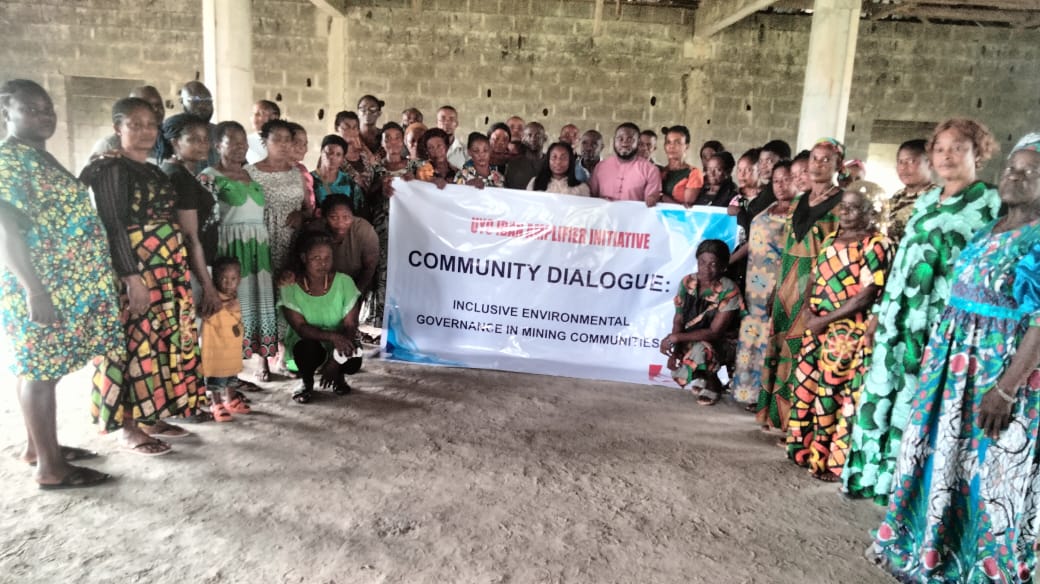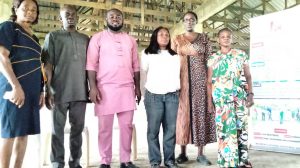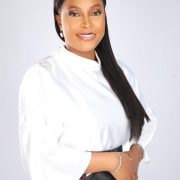When the Forest Fades: Obung Women Rise for Environmental Justice Amid Mining Devastation

By Unyime Okon
In Obung, a once lush community tucked within the green expanse of Cross River State National Park in Akamkpa Local Government Area of Cross River State, the rhythm of life has changed. The soft murmur of Ebanga Stream which was once the lifeline of the people has gone silent.
In its place, the thunder of blasting rocks, the noise from trucks carrying heavy rocks, and the choking dust of mining operations now fill the air. Yet, amidst the echoes of destruction, the women of Obung are finding their voices. They rise in unison to defend what remains of their environment, their history, their health, and their dignity.
It was on this premise that the Uyo Iban Amplifier Initiative (UIAI) convened a Community Dialogue on Environmental and Climate Justice for mining and forest communities at the Obung Town Hall on Tuesday, November 4, 2025. The dialogue, moderated by environmental activist Ekemini Simon, brought together women across age groups to reflect on how uncontrolled mining, deforestation, and cultural barriers have eroded not only their land but also attempted to silence their voices.
“The stream that healed us is gone”
Community Woman Leader Lawrencia Ntuei stood before the gathering, her voice heavy with memory.
“Ebanga Stream dried up. The company mining the rocks is operating on top of where the water used to come out to form the stream. Now, there is no natural water for us to drink,” she said.
She explained that the stream once carried medicinal powers enriched by its interaction with the rocks and forest roots. But today, even the boreholes provided by the company are dry. The only one that still flows is far away. It tastes bad on the taste bud, hard for washing clothes hence they say is unsafe for drinking.
“Our forest has vanished because of the mining,” Ntuei lamented, her eyes tracing the distance as though searching for the vanished green.
Voices silenced by patriarchy
For Lucy Ndifon Eta, the struggle is not only with the loss of nature but also with the social structure that stifles women’s participation on environmental issues and beyond.
“Our voices aren’t considered on environmental issues because our society is patriarchal. That is what we were born into” she said. “Even when we try to organise, some women withdraw at the last minute because their husbands forbid them to join those who speak out”.
Eta added that the community’s borehole had been dry for four months, forcing women to fetch toxic water from faraway sources. “We suspect this water is the cause of our strange sickness these days,” she added, frustration giving way to fear.
When women resist
But in the face of exclusion, the women of Obung have not always been silent. Beatrice George, the respected woman leader for the aged, shared a remarkable story, a tale of courage, unity, and the price of resistance.
Years ago, she recounted, a mining company had begun mining on their farm road blocking the only farm road women used. When appeals to male leaders for intervention failed, the women took the bull by the horns and organised a peaceful protest; singing and waving green leaves. The men, threatened by this boldness, ran to the company’s European managers, warning them that the women were coming to “kill” them.
“But we only wanted a road to our farms after staying hungry for days” George said, smiling at the memory. “When one of the Europeans was courageous enough to put behind the false narrative they were told, he came out and listened to us, he immediately ordered the creation of a new access road. Within hours, we had our road.”
Their victory, however, came at a steep cost.
“Our community leaders accused us of exposing ourselves to the Europeans and bringing a curse on the land. They said the mining machines were no longer crushing the rocks. As a result, they made life unbearable for us,” George recalled.
When the women threatened to relocate en masse to a neighboring community, the men were finally persuaded by the neighboring leaders to apologize.
“It taught us that when women stand united, we can resist what is wrong. That road still stands as a symbol of our courage.”
The slow death of a forest
In the corner of the hall, Immaculata Clement spoke softly but firmly.
“Mining has destroyed the herbs that used to heal us. Even some species of our treasured cocoyam are gone. The blasts from the rocks have cracked our homes too” she said. “When we complain, they threaten us that we will chase the company away. We need help.”
Her words painted a painful picture of a community caught between survival and silence, between manipulation, fear and the fight for justice.
“Don’t betray the Struggle “
The Executive Director of the Partnership for Social and Environmental Development Initiative (P4SEDI),Tatu Okang has called on the women not to give up or turn against their own cause.
“Don’t shoot yourself in the foot by betraying the struggle,” she cautioned. “You may face backlash from men, but stay firm. One day, there will be that one woman hero like Mama Beatrice whose courage will inspire others.”

Okang stressed that women’s involvement in environmental decision making is not a luxury but a necessity.
“While men may focus on the money mining brings, women think about the health of their children and the future of the land,” she said. “The woman’s voice is the conscience of the community.”
Turning pain into advocacy
In a rare show of solidarity from the government, the Director of Quality Control at the Cross River State Ministry of Environment, Mr. Agba Agbor has called on the women to channel their grievances through formal advocacy.
“Write letters to the Ministry. We are ready to intervene,” he advised. “Don’t let fear silence you. Partner with NGOs like the Uyo Iban Amplifier Initiative and the media to amplify your concerns.”
“We won’t leave you behind”
Closing the dialogue, Okoho Ene, Coordinator of Uyo Iban Amplifier Initiative, reaffirmed the organisation’s commitment to empowering women in mining and forest communities.
She reminded the participants that the dialogue was designed for discussions on inclusive environmental governance which she emphasized is a key step toward ensuring that everyone’s voice counts in decisions affecting the environment and livelihoods.
Ene expressed optimism that the dialogue would strengthen community participation, especially among women, youth, and marginalized groups in promoting transparency, accountability, and collaboration in environmental protection.
“We won’t leave you behind,” she said. “Stay steadfast. Deepen your collaboration. Together, we will keep amplifying your voices. Let us continue to explore practical ways to make governance more inclusive, fair, and sustainable because true environmental justice begins when everyone has a seat at the table.”
A new dawn in Obung
As the meeting drew to an end, the women lingered, some whispering, others nodding in renewed determination. For them, the dialogue was more than a meeting; it was an awakening.
From the dry bed of the Ebanga Stream to the dust-choked farmlands, Obung’s story mirrors the fate of many communities in Nigeria’s extractive frontlines where women bear the brunt of environmental degradation yet remain the least heard.
But perhaps, through voices like those of Lawrencia, Lucy, Beatrice, Immaculata and through platforms like the Obung Women Eco Defenders which was earlier inaugurated on Friday, October 31, 2025 by Uyo Iban Amplifier Initiative, a new chapter is being written: one where women no longer wait to be heard, but speak, act, and lead their communities toward ecological and climate justice.







